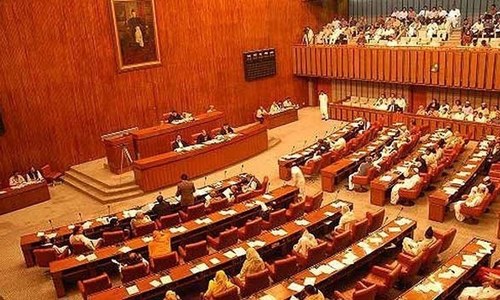ISLAMABAD: The Senate on Tuesday passed with amendments anti-money laundering (AML) and foreign exchange regulations bills that have already been approved by the National Assembly.
Both the bills, meant to comply with the Financial Action Task Force (FATF) conditions, will now be sent back to the National Assembly for reconsideration in the light of amendments suggested by the upper house of parliament.
Since June 2018, the FATF has placed Pakistan on the grey list — a category of countries whose mechanisms to curb money laundering and terror financing are seriously deficient.
The FATF plenary is set to review Pakistan’s status on Feb 16 amid chances that the country may remain on the grey list for another few months.
The AML bill passed by the National Assembly envisaged powers for the investigation officers to arrest money laundering suspects without warrants, a proposal rejected by the Senate. Another amendment is the omission of a clause proposing to declare money laundering a cognizable offence.
Legislation meant to comply with FATF conditions
The Senate approved enhancing penalties and also gave the nod to changes in the imprisonment limit. After the bill becomes an act of parliament, those found guilty of money laundering would be liable for imprisonment of one to 10 years. The fine will also increase from Rs1 million to a maximum of Rs5m.
Under another amendment, the Financial Management Unit (FMU) of the State Bank of Pakistan will be bound to promptly share information about money laundering with foreign jurisdictions, instead of waiting for the “due administrative process”. Similarly, banks will be bound to promptly share suspicious transactions reports with the FMU instead of the existing limit of within seven days.
The amended bill also seeks to empower the investigation officers to attach the property involved in money laundering for six months as against the current period of three months.
Banks will be bound to file suspicious transactions reports and, upon failing to do so, the individuals concerned will be liable to five years of imprisonment and a fine of Rs500,000.
The Senate approved most of the amendments proposed by the government in the Foreign Exchange Regulations Act, 1947, except the proposal to restrict inland movement of foreign currency by individuals to only $10,000.
Earlier, during the question hour, the house was informed that per capita water availability in Pakistan in 1951 was 5,260 m3 per annum, which was constantly decreasing and at present had reduced to less than 1,000 m3 per annum per capita due to increasing population, which is the stage of water scarcity.
Minister for Water Resources Faisal Vawda said in a written reply that the Water and Power Development Authority (Wapda) had prepared a comprehensive plan to address the water scarcity issue by storing floodwater during high flow season and utilise the same during lean season. He said that in the last decade, Wapda completed Mangla Dam raising (2.88 MAF), Gomal Zam Dam (0.892 MAF), Satpara Dam (0.053 MAF) and Darawat Dam (0.089 MAF) to store water. Diamer-Bhasha Dam (6.4 MAF), Mohmand (Munda) Dam (0.676 MAF) and Nai Gaj Dam (0.16 MAF) are at implementation stage.
“Wapda is also planning to construct Kurram Tangi Dam Stage-II (0.90 MAF), Chiniot Dam (0.85 MAF), Shyok Dam (5.0 MAF), Akhori Dam (6.0 MAF), Dudhnial Dam (1.00 MAF), Skardu Dam (3.20 MAF) and Sindh Barrage (2.00 MAF) to cope with the issues of water shortage in the country,” he said.
Published in Dawn, February 12th, 2020


































